Programme details
The “Policy Forum on Education Reform and Workforce Mobility in the Greater Bay Area, China”, organised by the Hong Kong Institute of Educational Research, and co-sponsored by the CUHK Guangdong-Hong Kong-Macau University Alliance Symposiums on Greater Bay Area Fund and the Tin Ka Ping Foundation, brings together leading researchers from different regions to discuss educational reform issues and social opportunities in the Greater Bay Area (GBA). The Forum adopts multiple perspectives to encompass the economic, social, political, psychological and policy aspects of educational issues in GBA.
Presented by:
Research Consortium on Education Policy and Development in Greater Bay Area
Hong Kong Institute of Educational Research
Poster
Schedule
Detailed Programme
The “Policy Forum on Education Reform and Workforce Mobility in the Greater Bay Area, China”, organised by the Hong Kong Institute of Educational Research, and co-sponsored by the CUHK Guangdong-Hong Kong-Macau University Alliance Symposiums on Greater Bay Area Fund and the Tin Ka Ping Foundation, brings together leading researchers from different regions to discuss educational reform issues and social opportunities in the Greater Bay Area (GBA). The Forum adopts multiple perspectives to encompass the economic, social, political, psychological and policy aspects of educational issues in GBA.
Date:
6 – 7 June 2022 (Monday-Tuesday)
Time:
8:30 AM – 12:00 PM (GMT+8, HK Time)
Language:
English
Presented by:
Research Consortium on Education Policy and Development in Greater Bay Area
Hong Kong Institute of Educational Research
Poster
Schedule
Detailed Programme
Policy Forum on Education Reform & Workforce Mobility in the Greater Bay Area, China held successfully
The Hong Kong Institute of Educational Research (HKIER) successfully hosted the “Policy Forum on Education Reform & Workforce Mobility in the Greater Bay Area, China” on 6-7 June, 2022 in a hybrid format. Sixteen researchers from different fields of expertise were invited to present and discuss in three panels related to education and labour mobility in the Greater Bay Area (GBA), China. The Forum attracted participants in person and online from different countries, including scholars, students, educational practitioners, and policy-makers.
The Forum was co-organized by Professor Kenneth K. Wong from Brown University and Professor Dongshu Ou, Associate Professor at the Department of Educational Administration and Policy and Associate Director of HKIER. This two half-day event, co-sponsored by the Tin Ka Ping Foundation and the CUHK Guangdong-Hong Kong-Macau University Alliance Symposiums on Greater Bay Area Fund, was part of the project in the “Research Consortium on Education Policy and Development in the Greater Bay Area.” The Forum aimed at bringing together leading researchers from different regions to discuss educational reform issues and social opportunities in the GBA. Multiple perspectives were adopted to encompass the economic, social, political, psychological, and policy aspects of educational issues in the GBA.
In the opening remarks, Dean of Faculty of Education Professor Xitao Fan highlighted the importance of the Forum on reinforcing the relationship between CUHK and GBA, and CUHK as an important hub for GBA educational policy research. Professor Heung Sang Stephen Wong, Director of the HKIER, talked about the contribution of HKIER on promoting research excellence in the GBA educational issues and enhancing regional collaboration via the Forum . The scientific co-chairs, Professor Kenneth K. Wong and Professor Dongshu Ou, introduced the background and aims of the Research Consortium and the Forum.
The first session “Higher education development” investigated the intention and impact of youth labour mobility. Professor Ka Ho Joshua Mok and Dr. Yin Ma’s team found that Hong Kong youth valued both motivation and working opportunities in the GBA cities when they made decision on cross-border work. Such results will be useful for policy formulation on promoting geographical movement of workers across regions, particularly in the post-pandemic period. Professor Li Yu discovered that returnee faculties outperformed their domestic colleagues in terms of research quality and quantity. Hiring more returnee academics would also benefit the research performance of the whole department, which further supported the introduction of returned talents at the tertiary education level. While recognising the contributions of both studies, Professor Bingqin Li, Professor Chen Li and Professor Yisu Zhuo provided comments on other factors related to cross-border work intention, academic research and its impact on community, as well as significance of academic publications in higher education development.
In the second session “Education and labour market outcomes”, both Professor Wing Kai Stephen Chiu and Professor Dongshu Ou explored higher education and earnings of highly educated workers. Professor Chiu commented that workers with postsecondary non-degree attainment suffered the most due to competition from those with higher and lower education levels. He showed that degree holders suffered greater income penalty for being overeducated. However, the negative effect of overeducation on job satisfaction could be mediated by higher income and occupational status. Professor Ou’s study compared high-skilled native and migrant male workers in Hong Kong and Guangdong . She demonstrated that among high-skilled workers, migrant workers earned more than natives in Guangdong during 2010-2018. Hong Kong’s high-skilled Mainlander immigrants are catching up with high-skilled natives over time. She also discussed how educational qualifications, returns to education and unobserved factors attributed to the changing wage gap. The discussants, Professor Yan Cao and Professor Huacong Liu, suggested some policy implications and prompted discussions on the future of higher education development and labour mobility in the GBA.
A wide range of challenges and opportunities faced by adolescences in the GBA were discussed in the third session “Youth development, well-being and national identity”. Professor Changqing Xu’s results revealed that cross-border learning experience, such as relationship with local peers and mobility frequency, were important in formation of sense of belonging towards country in the higher education. This suggested that national identity could be cultivated through appropriate policies like cultural inclusion programmes and academic exchange. Professor Ying Him Anthony Fung and Professor Sui Chu Esther Ho noticed that cyberbullies and cybervictims were more prevalent among school-aged children in Hong Kong than in Netherland. They investigated the interactions among problematic social media use, cyberbullying cybervictimisation, which would help policymakers to design suitable intervention and prevention programmes of cyberaggression. Professor Sara Zhong evaluated the influence of boarding schools on the psychological well-being, behaviours and academic performance of rural left-behind junior middle school students in Guangdong. Children in boarding schools enjoyed better development than those in non-boarding schools. These solid evidences will justify the value of improving rural boarding school management and allocating more helpers to support the disadvantaged rural children. Dr. Michael Hansen and Professor Ran Liu discussed various issues on this topic, including the link between happiness and national identity, the care for the vulnerable youths, correlational versus causal data analysis as well as policy suggestions.
In the closing remarks, Professor Kenneth K. Wong summarised the sessions and discussed ways of moving forward. Professor Dongshu Ou concluded the event by giving gratitude to the organizing staff and all participants. The Forum drew to a successful close.
The Hong Kong Institute of Educational Research (HKIER) successfully hosted the “Policy Forum on Education Reform & Workforce Mobility in the Greater Bay Area, China” on 6-7 June, 2022 in a hybrid format. Sixteen researchers from different fields of expertise were invited to present and discuss in three panels related to education and labour mobility in the Greater Bay Area (GBA), China. The Forum attracted participants in person and online from different countries, including scholars, students, educational practitioners, and policy-makers.
The Forum was co-organized by Professor Kenneth K. Wong from Brown University and Professor Dongshu Ou, Associate Professor at the Department of Educational Administration and Policy and Associate Director of HKIER. This two half-day event, co-sponsored by the Tin Ka Ping Foundation and the CUHK Guangdong-Hong Kong-Macau University Alliance Symposiums on Greater Bay Area Fund, was part of the project in the “Research Consortium on Education Policy and Development in the Greater Bay Area.” The Forum aimed at bringing together leading researchers from different regions to discuss educational reform issues and social opportunities in the GBA. Multiple perspectives were adopted to encompass the economic, social, political, psychological, and policy aspects of educational issues in the GBA.
In the opening remarks, Dean of Faculty of Education Professor Xitao Fan highlighted the importance of the Forum on reinforcing the relationship between CUHK and GBA, and CUHK as an important hub for GBA educational policy research. Professor Heung Sang Stephen Wong, Director of the HKIER, talked about the contribution of HKIER on promoting research excellence in the GBA educational issues and enhancing regional collaboration via the Forum . The scientific co-chairs, Professor Kenneth K. Wong and Professor Dongshu Ou, introduced the background and aims of the Research Consortium and the Forum.
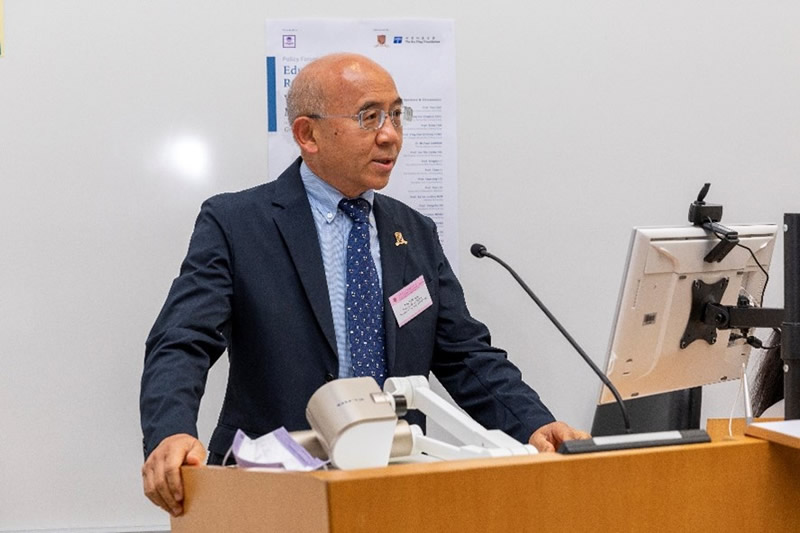
Welcoming speech by Professor Xitao Fan, Dean of Faculty of Education
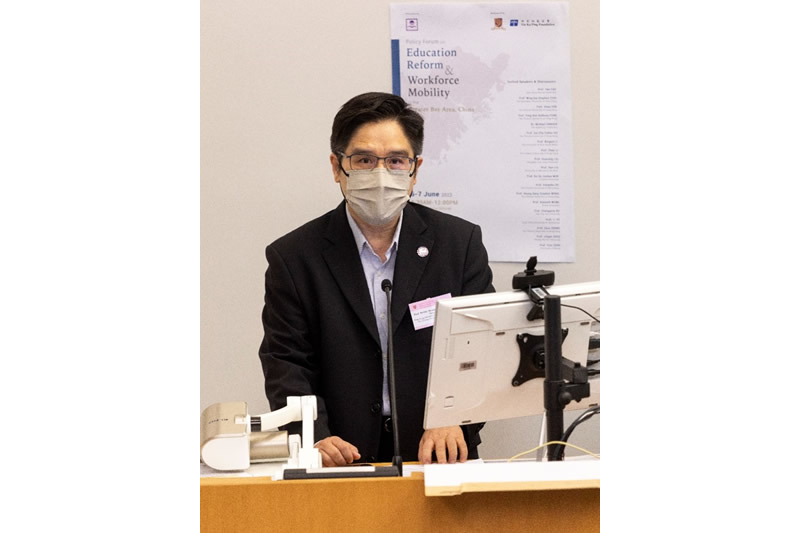
Welcoming speech by Professor Heung Sang Stephen Wong, Director of HKIER
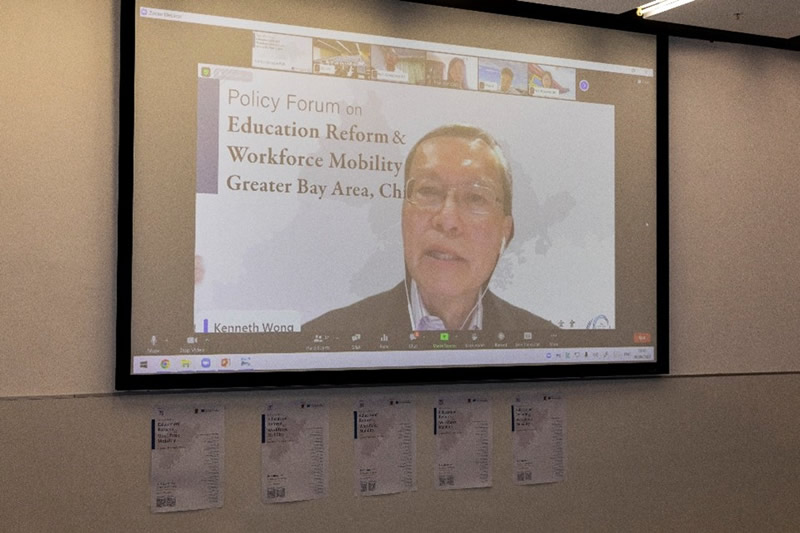
Professor Kenneth K. Wong introduced the Research Consortium
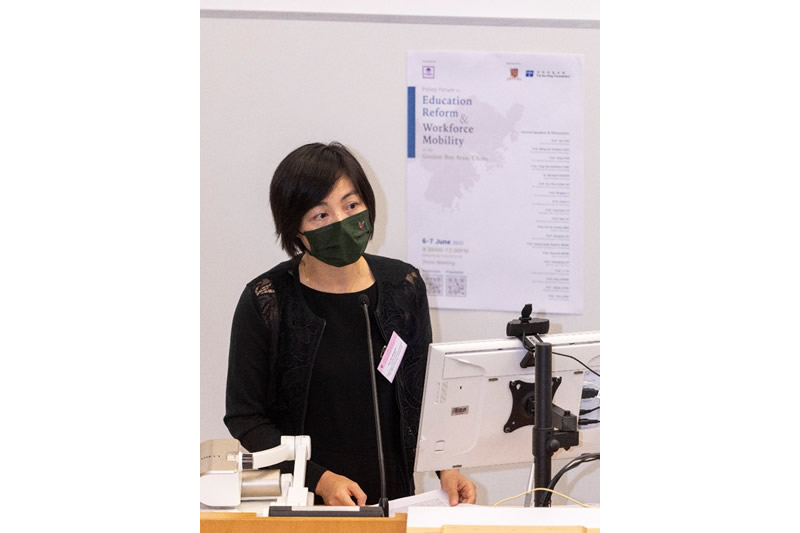
Professor Dongshu Ou talked about the goal of Policy Forum
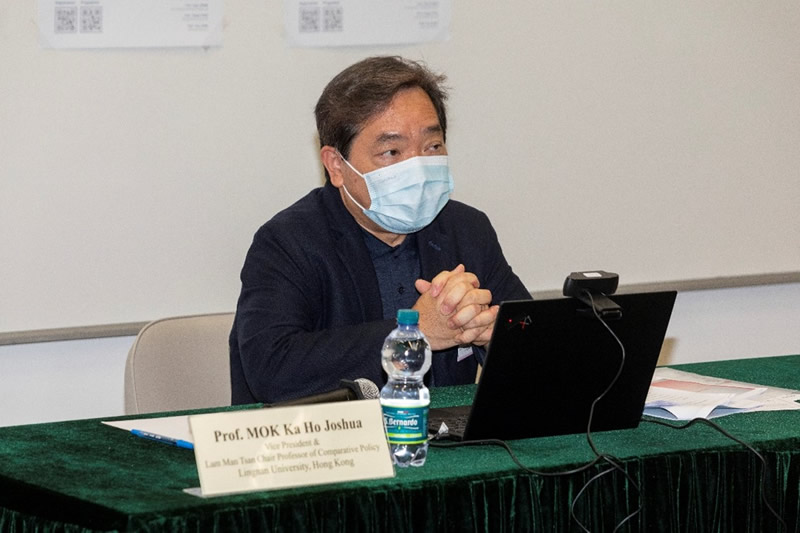
Professor Ka Ho Joshua Mok talked about Hong Kong youth's intention of cross-labour mobility in session 1
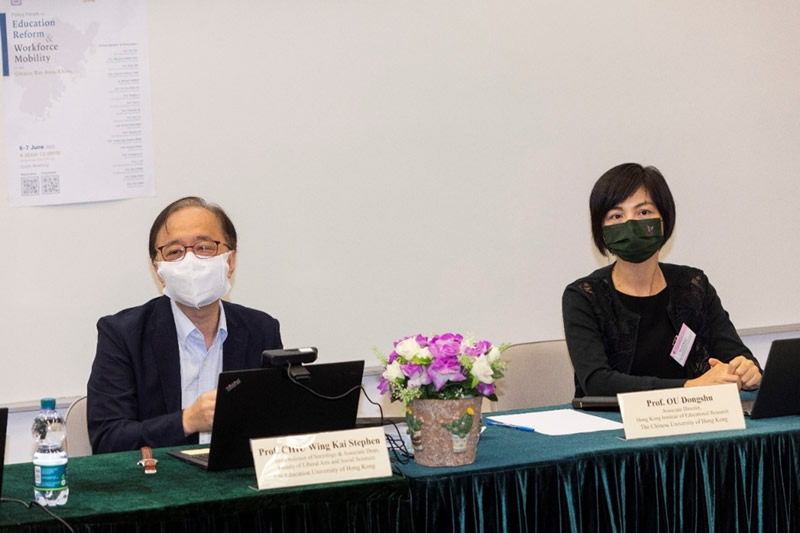
Professor Wing Kai Stephen Wong and Professor Dongshu Ou in session 2
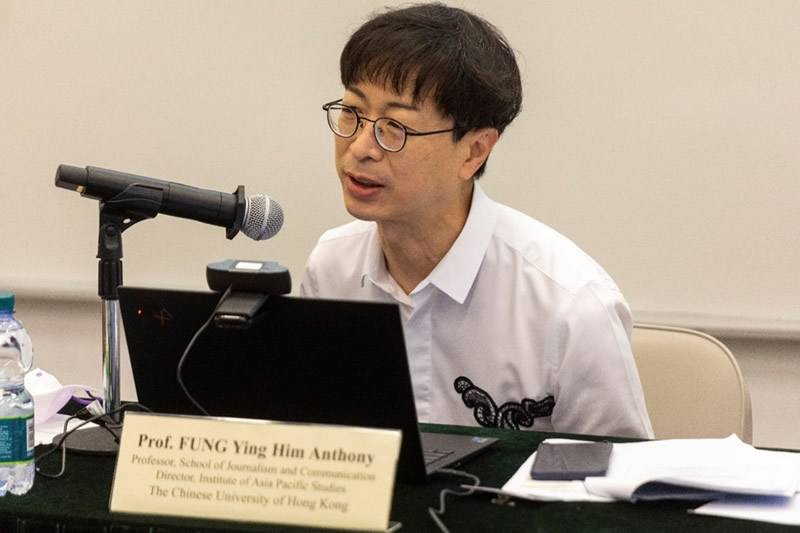
Professor Ying Him Anthony Fung discussed the cyberbullying and cybervictimisation in Hong Kong in session 3
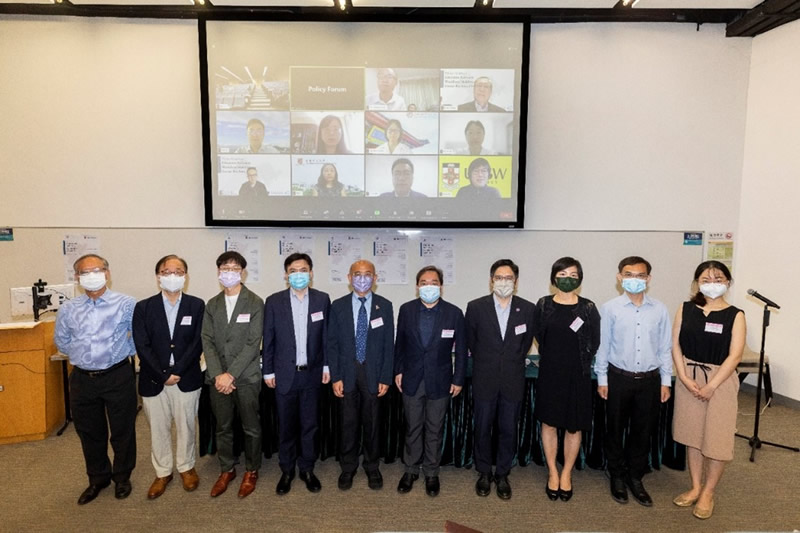
Group photo of presenters and discussants on Day 1




